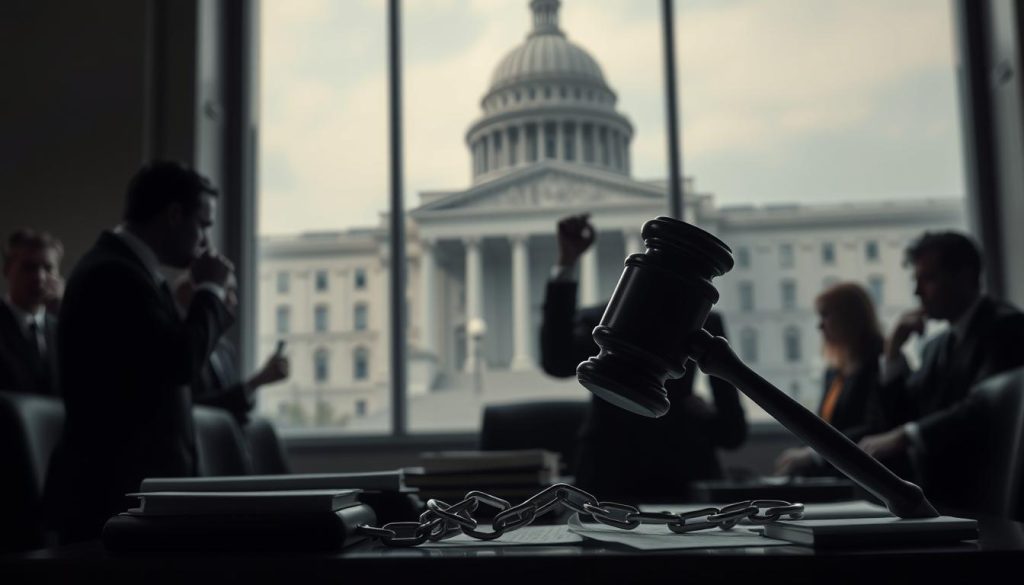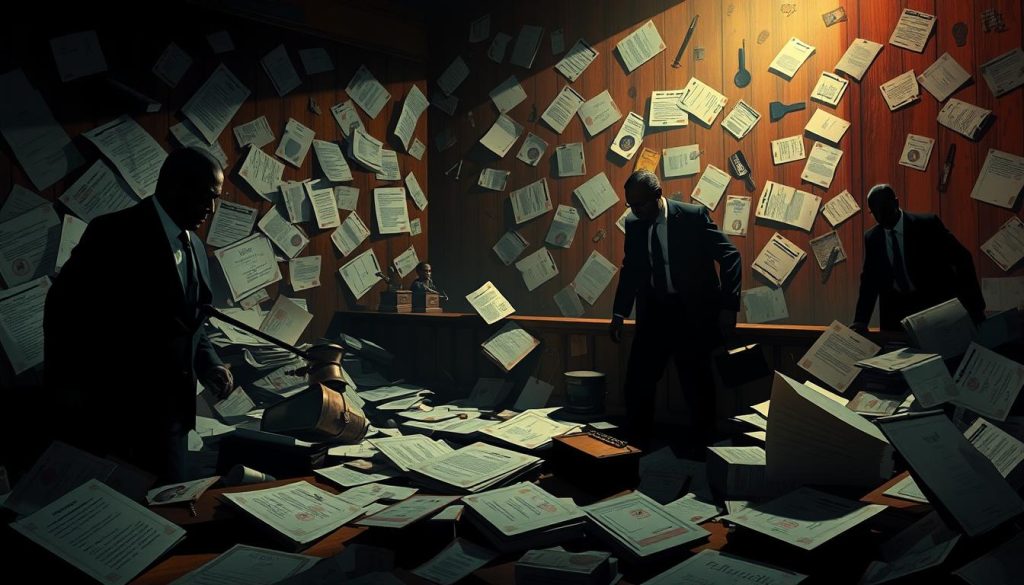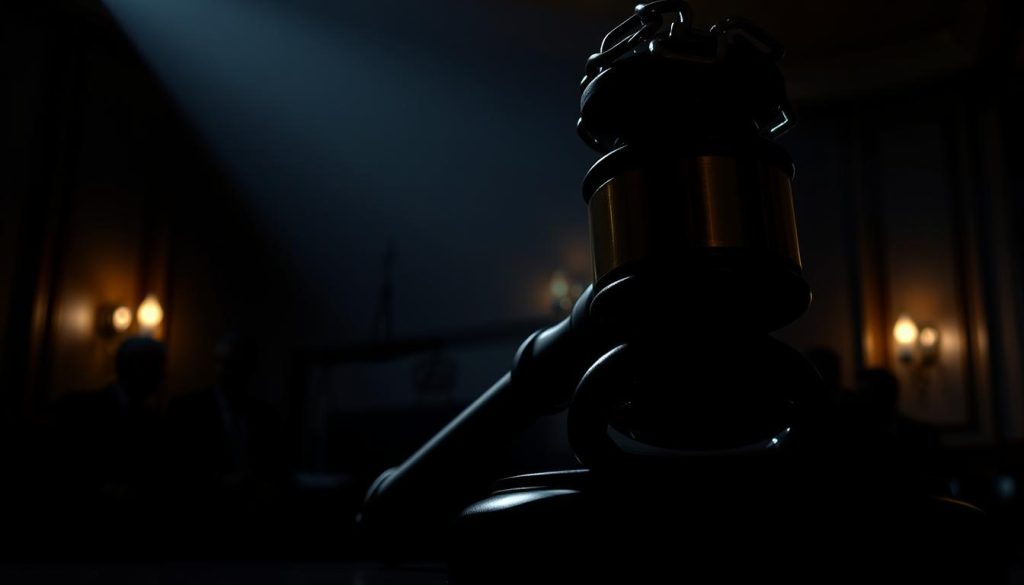The idea of criminal defense conspiracy is complex and often debated1. Federal conspiracy charges are common and help prosecutors gather more evidence for convictions1. These charges apply to many crimes, like drug trafficking, fraud, and violent crimes1.
Conspiracy charges don’t need a written agreement or direct contact between people1. This means even small roles can lead to harsh punishments1. It’s important to get a good defense attorney quickly to lessen the impact1.
Some think lawyers and the justice system are too close, like they’re “in bed” together. But, a skilled defense attorney can greatly improve your case, even with complex charges1. They need to understand the government’s evidence and your role in the conspiracy to defend you well1.
Key Takeaways
- Conspiracy charges are a serious, felony-level offense that can carry severe consequences for those convicted.
- Prosecutors often use conspiracy charges strategically to introduce a larger body of evidence, facilitating convictions.
- Even if you’re found guilty, a skilled lawyer can help lessen the damage and make a big difference in your future.
- Conspiracy charges do not require a written agreement or direct interaction between individuals, making them potentially broader in scope.
- Contacting a skilled defense attorney promptly is crucial when facing conspiracy charges to develop an effective defense strategy.
- https://finserviceshub.com/refinancing-understanding-and-mastering-the-concepts-for-professionals/
Understanding Criminal Conspiracy Laws
Criminal conspiracy is a complex legal concept. It involves two or more individuals planning and executing unlawful activities2. To prove a criminal conspiracy, prosecutors must show an agreement between at least two people to plan or discuss illegal actions2. The penalties for these crimes can vary greatly, depending on the applicable state or federal laws and the severity of the underlying offense3.
Defining Conspiracy
There is a legal debate around the requirement for “guilty minds” in a conspiracy. The bilateral approach says both co-conspirators must have a sincere intent to commit the crime2. On the other hand, the unilateral approach, adopted by the Model Penal Code and some states, only requires one person to have a guilty mindset2. Most jurisdictions also mandate that at least one member of the conspiracy must take a concrete step to further the illegal objective, known as an “overt act.”2
Elements of Conspiracy
Conspiracy is considered a specific intent crime, wherein the defendant must act with a particular goal in mind2. This includes the intent to agree on a plan to commit an illegal act and to achieve the unlawful objective of the conspiracy2. Moreover, some states have expanded the definition of conspiracy to include legal activities if the purpose is to engage in behavior harmful to public health, such as operating a loan shark business2.
The agreement is the most critical element in a conspiracy case, and it does not need to be formal or detailed; its existence can be inferred from the circumstances, even without direct evidence of a written or verbal plan2. It is important to note that the crime of conspiracy is distinct from the completed crime, and individuals can be charged with both conspiracy to commit a crime and the actual completed offense2.
| Approach | Description |
|---|---|
| Bilateral Approach | Requires both co-conspirators to have a guilty mind. If one is acquitted, the other cannot be guilty. |
| Unilateral Approach | Only requires one person to have a guilty mind, as per the Model Penal Code and some states. |
The penalties for conspiracy crimes have also evolved over time3. The maximum imprisonment for conspiracy under Title 18, U.S.C., was increased from 2 years to 5 years, except in cases where the conspiracy is related to a misdemeanor, where the maximum is limited to 1 year3. Concerns were raised by judges regarding the adequacy of the 2-year sentence for serious offenses related to conspiracy under existing law3.
“Conspiracy is a complex legal concept that involves two or more individuals planning and executing unlawful activities.”
Types of Federal Conspiracy Charges
Federal conspiracy charges are serious, with penalties as harsh as the original crime. Conspiracy to commit a crime involves two or more people agreeing to do something illegal. Terrorism conspiracy and treason conspiracy target plots against national security or the government. White-collar conspiracy includes fraud or embezzlement, while drug conspiracy focuses on drug manufacture, distribution, or trafficking4.
It’s hard to prove a federal conspiracy. Prosecutors must show an agreement and an act to carry out the plan. They use emails, witness statements, and documents to prove it. The rules for proving a conspiracy vary by location and crime type5.
- Federal conspiracy charges cover many crimes, like fraud and drug trafficking6.
- The government often goes after smaller players first. They might cooperate because of pressure or deals6.
- In federal cases, everyone involved can be held responsible for acts done within the conspiracy, even if they didn’t do them themselves6.
Defending against federal conspiracy charges is complex. The government doesn’t need to prove the crime was done, just that there was a plan to do it. Penalties for conspiracy are often the same as those for the underlying offense5.
| Conspiracy Statute | Maximum Punishment |
|---|---|
| General Conspiracy (18 U.S.C. § 371) | Not more than five (5) years and a fine up to $250,000.00 for a felony offense4 |
Federal conspiracy charges are complex and serious. They carry big consequences. It’s vital to have experienced legal help to understand these cases. 
criminal defense conspiracy: Navigating Legal Complexities
Defending against conspiracy charges is a big challenge. It needs a deep understanding of the legal complexities. Federal conspiracy laws use evidence, witness statements, and records to build a case. Prosecutors must prove the defendant knew and agreed to commit a crime.
Evidentiary Challenges
Understanding evidence is key when facing conspiracy charges. Circumstantial evidence is important but must be carefully checked. Witness testimonies can be biased and should be closely looked at. Communication records need to be verified to avoid misunderstandings.
- Challenging the admissibility and weight of circumstantial evidence is a common defense strategy.
- Exposing potential issues with witness credibility, such as ulterior motives or lack of firsthand knowledge, can undermine the prosecution’s case.
- Scrutinizing the chain of custody and accuracy of communication records is essential to ensure they are not taken out of context.
Sentencing Guidelines and Mitigation
Conspiracy charges can lead to big legal risks, including fines and long prison sentences7. A conviction under 18 U.S.C. § 371 can mean up to 5 years in prison and a fine of up to $250,0007. For drug-related conspiracies, sentences can be life, with fines up to $10 million7. Those convicted of fraud or financial crimes under 18 U.S.C. § 1349 could face up to 30 years in prison and fines up to $1 million7.
Having a skilled lawyer is crucial in dealing with these sentencing guidelines. Lawyers can argue for a lighter sentence by questioning the evidence or showing the defendant’s limited role8.
“Conspiracy charges can lead to significant criminal penalties, including imprisonment, fines, and probation7. Successful defense strategies often focus on undermining prosecution’s evidence, challenging the existence of an agreement, or disputing the significance of alleged overt acts.”

Defending Against Conspiracy Charges
Facing conspiracy charges is a tough legal fight. But, with the right defense, you can fight these charges and protect your rights. A skilled criminal defense lawyer is key in using conspiracy defense strategies and conspiracy case defense.
Conspiracy charges can be misdemeanors or felonies, depending on the case9. If found guilty, you could face prison, probation, and big fines9. It’s vital to have an experienced lawyer who knows how to defend against these charges.
Your lawyer might use several ways to challenge the prosecution, such as:
- Examining the evidence’s strength and reliability, including electronic evidence and witness statements10
- Using legal rules, like the Wharton Rule, to possibly dismiss charges11
- Looking into other defenses, like withdrawing from the conspiracy or being under duress11
- Talking to prosecutors to try to lower the charges or penalties, which can help your case9
The main goal is to build a strong defense that questions the prosecution’s case. With a skilled lawyer, you can tackle the challenges of defending against conspiracy charges and aim for a better outcome.
“An aggressive defense can make a significant difference in getting a dismissal of the charges against you, especially when it comes to federal prosecution.”9
Conclusion
When you face criminal defense conspiracy charges, it’s vital to know the seriousness of the situation. You need to work closely with a skilled attorney. These cases can result in long prison sentences and a permanent criminal record. So, having a strong legal strategy is crucial12.
A knowledgeable criminal defense lawyer can guide you through the complex federal conspiracy laws. They can build a strong defense plan and fight to protect your rights. They offer valuable insights into the details of conspiracy charges, like proving intent, agreement, and overt acts13.
With the help of an experienced legal professional, you can aim for the best outcome in your case. They can help challenge the evidence, negotiate a plea bargain, or defend your innocence at trial. A skilled criminal defense attorney can make a big difference in getting a favorable result14.
FAQ
What is the importance of understanding criminal conspiracy laws?
Criminal courts and legislatures see crimes with many people involved as more harmful. They are harder to solve than crimes done by one person. Because of this, criminal conspiracy is a serious crime with big penalties for those found guilty.
How is a criminal conspiracy defined?
Conspiracy means two or more people planning and doing something illegal. Prosecutors must show that at least two people agreed to do something wrong. The penalties depend on the state or federal laws and how serious the crime is.
What are the common types of federal conspiracy charges?
Federal conspiracy crimes happen when two or more people agree to do something illegal. Common types include planning a crime, terrorism, treason, white-collar crimes, and drug offenses. The penalties for these can be as harsh as the original crime, making them a big worry for those accused.
What are the evidentiary challenges in criminal defense conspiracy cases?
Proving conspiracy can be hard, using evidence like emails and witness statements. The rules for proving a conspiracy can change based on where the case is heard. Indirect evidence is key, but its strength and trustworthiness must be questioned.
Witness testimonies can be doubted due to biases or motives. Communication records must be verified and put in context.
How can sentencing guidelines and mitigation help in conspiracy cases?
Being charged with conspiracy means facing big legal risks, like fines or jail. Understanding the sentencing rules can help lessen the punishment. Good legal help is key in conspiracy cases.
Skilled lawyers guide clients through the legal process. They help build a strong defense, using motions to suppress evidence or arguing the defendant didn’t intend to join the conspiracy.
What are the key strategies for defending against conspiracy charges?
Challenging conspiracy charges is complex. Federal laws can charge you for agreeing to commit a crime, even if it wasn’t done. A skilled lawyer can use many strategies to fight conspiracy charges.
They might question witnesses or try to get charges dropped. They could also negotiate with prosecutors to lessen the penalties. The main goal is to create a strong defense that doubts the prosecution’s case and improves the client’s chances.

